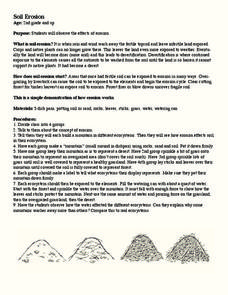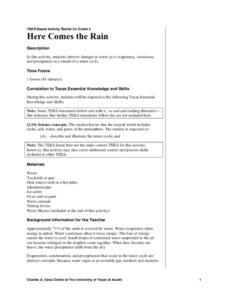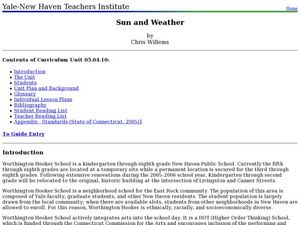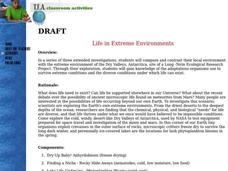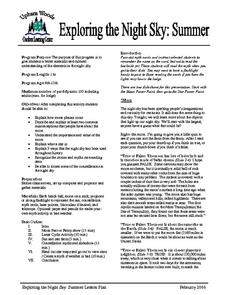Curated OER
How We See Things
Students explain that when a beam of light is reflected from its surface, it changes direction. In this virtual science experiment lesson plan, students complete an activity that requires them to investigate how flat mirrors reflect...
Curated OER
Growing Plants
Students explore plants and recognize that they are living things that require light and water to grow. In this online plant biology lesson, students identify, name and match the parts of plants. Extension activities and suggested...
Curated OER
Pushes and Pulls
Students examine different types of movement and causes that may affect those movements. In this online interactive forces and motion lesson plan, students use toy cars to observe push and pull and then make predictions and collect data...
Curated OER
Soil Erosion
Second graders complete activities to observe the effects of erosion. In this erosion lesson, 2nd graders define erosion and learn the process. Students complete an erosion experiment.
Curated OER
Regolith Formation
Students study what regolith is and how it contrasts with weathering on Earth. In this weathering instructional activity students divide into groups, hypothesize and confirm their guesses.
Curated OER
Here Comes the Rain
Second graders help to prepare a model of the water cycle before the conduction of this experiment. They use the model in order to observe changes that happen to water when it changes states of matter.
Curated OER
Do You See What I See?
Second graders view a teacher-created terrarium, and complete a KWL chart. They discuss what they can see, Students go on a nature walk and compare the schoolyard to the terrarium, discussing the roles of rocks, plants, soil, and water...
Curated OER
Sustainable Southern Belize: Coral Health Lesson Plan
Fifth graders investigate coral reefs and the dangers they face by labeling and drawing. In this oceanography lesson plan, 5th graders view a PowerPoint presentation of photographs of coral reefs in Belize. Students investigate and...
Curated OER
The Radish Experiment
First graders grow radishes. In this Science lesson, 1st graders observe the growth of radishes in both the light and dark. Students discuss what plants need to live.
Curated OER
Losing An Island
Students examine carbon dioxide and determine the impact of greenhouse gases on the earths spheres. In this pollution lesson students complete a lab activity to see the impact of gases on the environment,
Curated OER
Hey, Look Me Over!
Students make observations about mealworms using hand lenses, rulers, and cotton swabs. Students complete their own mealworm observation chart, then they share their observations with the class. This is one station out of five in an...
Curated OER
Could You Be a Star?
In this personality quiz worksheet, students complete 5 multiple choice questions. Students add their score and find out what kind of "star" they are: sports, movie, rock, or super star. The questions are best suited for UK students.
Curated OER
Frozen Film
Students are introduced to the topic of light interference through this hands-on activity. They observe how light reflects off two surfaces and then meets to form an interesting variation of color on a film surface.
Curated OER
Water and Ice
Young scholars explore water as it changes states of matter. In this physical property lesson, students use observation, measurement, and communication skills to describe changes in water as it goes from a solid to a liquid and back again.
Curated OER
Sun and Weather
How is the Earth's weather created? Middle schoolers will explain how the Sun's energy is transformed into different forms. They will perform mathematical calculations of volume, mass, and temperature. They they will explain the...
Curated OER
Air Pollution
Students seek solutions to environmental problems. They discover how to conserve and protect natural resources. They examine the role of acid rain on plants and discover how to filter pollutants.
Curated OER
Using Triangulation to Locate Meteorites from Witnessed Falls
High schoolers participate in a mock investigation in which they must interview and record data given by 3 people ("witnesses") in an effort to triangulate the location of a meteorite.
Curated OER
Models of Succession
Students create a model city in order to understand the effects human habitats have on the environment. In this environment lesson, students examine the effects human habitats have on the environment. Students create a model city and...
Curated OER
Life in Extreme Environments
Students compare and contrast local environments with the extreme environment of the Dry Valleys, Antarctica. Students explore and gain knowledge of the adaptations organisms use to survive extreme conditions and the diverse conditions...
Curated OER
Exploring the Night Sky: Summer
Students explain how moon phases occur. They describe and explain at least two common misconceptions that people have about the moon. Students explain what a star is. They explain 3 ways that the night sky has been used throughout history.
Curated OER
Landfills: A Solid Waste Management Plan
Middle schoolers are able to list the types of household waste that they produce daily. They are able to describe some other types of waste that are produced by industry or agriculture to help maintain their lifestyles. Students are...
Curated OER
Plate Tectonics
Students participate in a series of experiments to learn about plate tectonics and the different materials of the Earth. In this plate tectonics lesson plan, students use eggs, water, beakers, paper, and more materials to learn about the...
Columbus City Schools
Thinking Like A Soil Scientist
Ready to roll up those sleeves and get your hands dirty? Dirty with soil science content, that is! Overcome those "But it's just dirt" objections with a trip outside to collect soil samples for some in-class analysis. Use the variety of...
Curated OER
Sink or Float
Using a variety of objects, learners conduct buoyancy experiments. They make predictions on which object will sink or float and test their predictions. They use a graphic organizer to record their findings.





